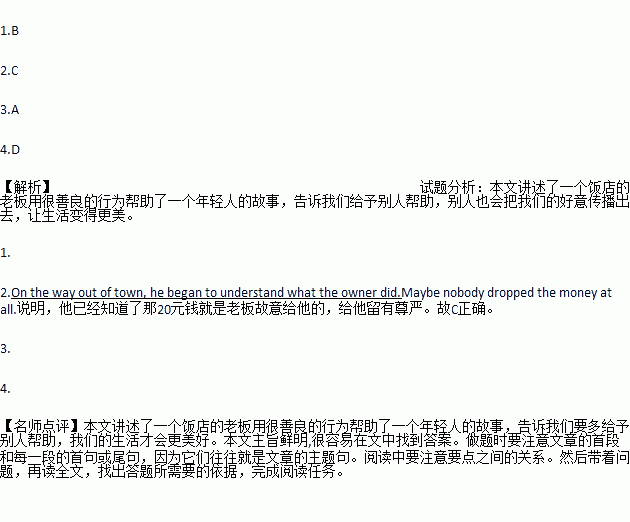题目内容
In 1971 a young man who grew up very poor was travelling across the country, trying to make a new start for himself. Along the way he had completely run out of(用光) money and was forced to spend the night in his car. This continued until one morning, after a week of sleeping in his car, he walked nervously into a restaurant and ordered a big breakfast.
After eating his first good meal in weeks, he found himself lying to the waiter, telling him he had lost his wallet. The waiter, who was also the owner, walked behind the chair where the young man had been sitting. He bent down, and came up with a $20 bill that looked as if it had fallen on the floor and said, “Son, you must have dropped this,” the owner said. The young man couldn’t believe his luck! He quickly paid for the breakfast, left a tip, bought gas with the change, and headed West.
On the way out of town, he began to understand what the owner did.Maybe nobody dropped the money at all. “Maybe that fellow just knew I was in trouble and he helped me in a way that didn’t embarrass(使尴尬) me. So I just made a promise to help other people if I can.”
Later, he worked very hard and became a rich man. Now he lives near Kansas City. Each year he gives away thousands of dollars. He is known as the “Secret Santa” because at Christmas time each year, he personally hands money out to those on the street and at restaurants. Last year, he gave more than $50,000 away in Kansas City.
1.The young man was travelling across the country in 1971 to ________.
A. look for a good restaurant B. improve his life
C. show his new car to others D. hand out dollars
2.The underline sentence implies that the young man got to know that ________.
A. it was very lucky of him to get his lost money back.
B. it was very honest of the owner to return his money
C. the owner helped him in a way that didn’t hurt his feeling
D. another person who had breakfast in the restaurant lost the money
3.From the end of the passage we can learn that ________.
A. the man did carry out his promise
B. the man was not successful in the end
C. the owner was paid back the money
D. Santa give the man money each year
4.The message of the story is“________”.
A. One good turn deserves another
B. Where there is a will,there is a way
C. He who travels far knows much
D. Give love wings(翅膀) and it may fly higher
 天天向上一本好卷系列答案
天天向上一本好卷系列答案 小学生10分钟应用题系列答案
小学生10分钟应用题系列答案

 B. reject C. help D. scold
B. reject C. help D. scold